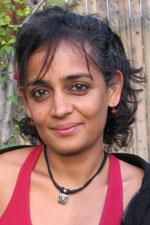Politics, anti-globalization, humanity, justice, peace, fair trade, middle east, America, India, protests, speeches, human rights, love, socialism, social justice, progressive, Iraq, Iran, Afghanistan, Syria, England, Palestine, Arundhati Roy, The God of Small Things, War Talk, The Cost of Living, An Ordinary Person's Guide to Empire, Public Power in the Age of Empire, Power Politics, The Checkbook and the Cruise Missile, Noam Chomsky
I'd like to meet:
Anyone who is a fan of Arundhati Roy and what she stands for.Anyone that works towards peace, equality, human rights, social justice.Anyone that can help get the word out about the wonderful We documentary.Anyone who wants to join the army.... Arundhati's Army of world peace and social justice!
Please note that this page is not run by Arundhati Roy, however she is most likely aware of it since we've heard from her agent. This MySpace profile was created by fans to network other fans and supporters of Ms. Roy, as well as the wonderful film available at weroy.org , which Ms. Roy is also very aware of. We're also here to help spread Arundhati's words and wisdom to more people around the world.
Television:
Democracy Now!, Free Speech TV, Current TV, The Daily Show, The Colbert Report
Books:
Arundhati Roy offers us this lucid briefing on what the Bush administration really means when it talks about "compassionate conservativism" and "the war on terror." Roy has characteristic fun in these essays, skewering the hypocrisy of the more-democratic-than-thou clan.
But above all, she aims to remind us that we hold the essence of power and the foundation of genuine democracy-the power of the people to counter their self-appointed leaders' tyranny. First delivered as fiery speeches to sold-out crowds, together these essays are a call to arms against "the apocalyptic apparatus of the American empire."
In her third volume of nonfiction, she valiantly addresses questions of power and its abuse, and powerlessness and its transformation via dissent and activism into a force for positive change. Roy dissects her country's violent religious conflicts, celebrates and mourns the seemingly lost legacy of Gandhi, and condemns India's gargantuan and environmentally unsound hydroelectric dam projects and the concomitant displacement of hundreds of thousands of people. She also discusses with invaluable clarity the mess in the Middle East, and presents razor-sharp interpretations of the U.S. government's foreign policy and the insidious influence of mega-corporations.
Roy clarifies the political and human stakes of "regime change" and reaffirms the imporance of activism and protest. In her major address to the 99th annual meeting of the American Sociological Association on August 16, 2004, "Public Power in the Age of Empire," broadcast nationally on C-Span Book TV and on Democracy Now! and Alternative Radio, writer Arundhati Roy brilliantly examines the limits to democracy in the world today. Roy discusses the need for social movements to contest the occupation of Iraq and the reduction of "democracy" to elections with no meaningful alternatives allowed. She explores the dangers of the "NGO-ization of resistance," shows how governments that block nonviolent dissent in fact encourage terrorism, and examines the role of the corporate media in marginalizing oppositional voices.
Arundhati Roy -"India's most impassioned critic of globalization" (New York Times) has expanded the compelling first edition of Power Politics with two new essays on the U.S. war on terrorism. A Book Sense 76 choice for November/December 2001 and Los Angeles Times "Discoveries" selection, Power Politics challenges the idea that only experts can speak out on such urgent matters as nuclear war, the privatization of India's power supply by U.S.-based energy companies, and the construction of monumental dams in India.
A skillful interviewer can reveal aspects of a writer's voice in simple yet telling ways. As a novelist, Arundhati Roy is known for her lush language and intricate structure. As a political essayist, her prose is searching and fierce. All of these qualities shine through in the interviews collected by David Barsamian for Globalizing Dissent: Converations with Arundhati Roy. New and devoted readers will find that these exchanges, recorded between 2001 and 2003, add to their appreciation of Roy's previous work.
This book consists of two parts: "The Greater Common Good" attacks the construction of the Sardar Sarovar Dam on the Narmada river in western India, while "The End of Imagination" denounces India's nuclear tests in May 1998. The Save the Narmada movement, a grass-roots, anti-dam movement that has been agitating for over a decade, believes that instead of being a solution to India's water and power shortages, the still-incomplete dam will cause immense distress owing to the displacement of 40 million people, the submergence of 245 villages, inequities in resettlement, and environmental disasters. Roy's polemical tract on their behalf, while not a dispassionate inquiry, raises some important questions about the real price of "development," whether in the form of big dams or bombs.
In her first novel, award-winning Indian screenwriter Arundhati Roy conjures a whoosh of wordplay that rises from the pages like a brilliant jazz improvisation. The God of Small Things is nominally the story of young twins Rahel and Estha and the rest of their family, but the book feels like a million stories spinning out indefinitely; it is the product of a genius child-mind that takes everything in and transforms it in an alchemy of poetry.
Heroes:
Arundhati Roy, Howard Zinn, Noam Chomsky, Gore Vidal, Nelson Mandela, Gandhi, Rosa Parks, Martin Luther King, Anna Politkovskaya, peace activists, anyone who stands up for humanity.
